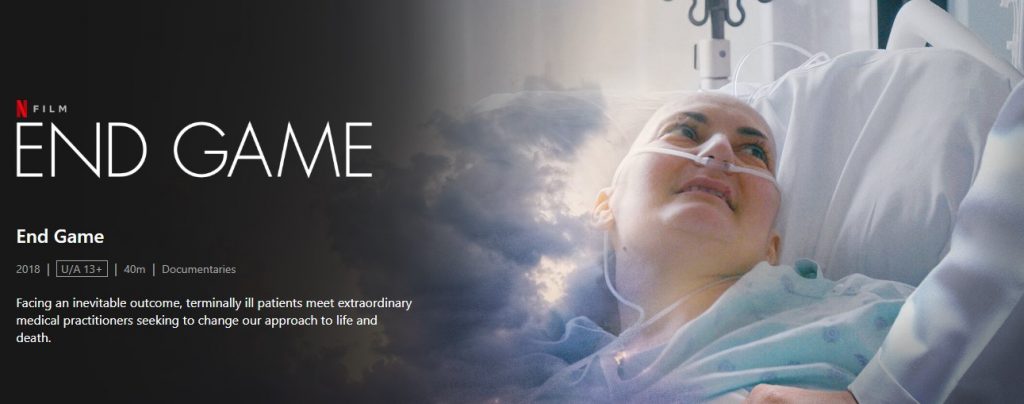“End Game” Might Scare People, But it Shouldn’t

Pallium India’s friend and volunteer Sunshine Mugrabi writes about a recent film on Netflix:
A woman lies in a hospital bed, her head shaved, her face pale yet luminous. The doctor at her bedside talks with her in a gentle voice, while her social worker looks on.
The camera pans to a whiteboard on the wall. A child has drawn a picture of her, with the words “Get well Mom” next to it.
This is the opening scene of “End Game,” a new documentary on Netflix that delves into the lives of terminally ill people during their final days.
A film about death and dying might not be most people’s idea of a fun evening’s entertainment. But the documentary is a beautiful meditation on what makes us human–in all its fragility, fear, humor and sadness.
The movie was shot in San Francisco, California in two locations: The University of California, San Francisco Medical Center, and Zen Hospice, a homelike facility on a residential street.
“End Game” grapples with death in close up, intimate ways rarely seen on screen.
As Mitra, the woman in the opening scene, reaches the end of her life, her husband Hamid and mother Vaji must make difficult decisions. Should they continue treatment or move on to palliative care? Should they donate her body to science?
In one poignant scene, Vaji and Hamid meet with a doctor who wants to enroll Mitra in a research project to study her cancer. This means opening her up after her death and removing the organs the cancer has attacked.
Vaji asks Mitra’s doctor what he would do if this were his wife or daughter.
“Be honest,” she urges.
It’s a good question. But he answers too fast that he would go ahead with it. This shows the empathy gap many families experience when dealing with doctors.
Vaji breaks down sobbing.
The scenes at Zen Hospice show a warmer atmosphere. Pat, an African-American woman with incurable uterine cancer, tells her story to a volunteer. Her eyes fill with tears as she recounts the moment her doctor gave her the news.
The tears spill over, but she also smiles. She talks about the relief she feels knowing she’s monitored and cared for. The day to day support is her focus now.
Zen Hospice Executive Director Dr. B.J. Miller fills the screen with his presence. He’s handsome, with chiseled features and salt and pepper hair. He talks about his philosophy, which is that rather than avoiding suffering, it’s better to move towards it.
Death isn’t hidden away there, he explains. This is followed by footage of staff members covering a body in flower petals.
Dr. Miller had his own brush with death. When he was in college, he and some friends were playing around on a parked train car. He was electrocuted. The doctors amputated his left arm below the elbow, and both of his legs below the knee.
His disability makes it possible for him to connect with patients and their families in a way that others might not, he explains. He doesn’t hide his amputations. Far from it–he wears short sleeve shirts and shorts that reveal his prosthetic limbs.
In one scene, he meets with a patient named Thekla, encouraging her to get comfortable with the idea of death. She says she has failed to “make friends” with death as he had assigned her to. So he suggests she find ways make the subject part of her life, not necessarily in a friendly way.
“The scary part is the unknown and the lack of control,” she says.
There’s camaraderie in this interaction. A partnership in which both are learning how to hold the mystery that is death.
In another scene, Dr. Miller welcomes a new patient to the hospice, a frail, emaciated Asian man. Dr. Miller tells him he’s become popular there.
The man’s face breaks into a near toothless smile. Later, the camera focuses on him as he’s being bathed in bed, bubbles covering his bony chest.
The film turns ordinary moments into meaningful ones. It shows that when death is near, it’s impossible to escape the reality that each one of those moments could be the last.
In this way, “End Game” succeeds in bringing out the complex yet beautiful experience that is death.
“This part of my life is wonderful,” Tekla says. “And who would’ve thought?”
You can watch the movie here: https://www.netflix.com/in/title/80210691




